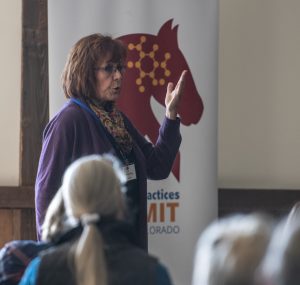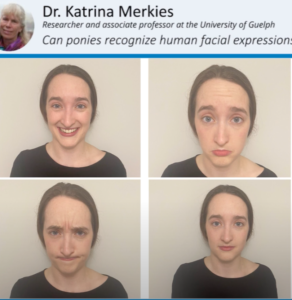We offer these shows for free. If you think it’s worthy of a small contribution, we sure would appreciate it.

Dr. Sheryl King
This is Episode 26 of Season 3 and in it, Jec and I talk with Dr. Sheree King about science, specifically equine research. But it’s also a conversation of how to consider science in today’s world of scholarly access, social media, and, quite frankly, the troubling politics around scientific information.
For most of my life, I have embraced science, research, the power of the scientific method, putting ideas out there and testing them. I’ve conducted research and I’ve assisted others with research projects. In case you were noodling on just what science is — it is the systematic study of the structure and behavior of the physical and natural world through observation, experimentation, and the testing of theories against the evidence obtained.
I am happy to approach my horse work with a critical eye nurtured, I think, by my science-y background. Do you consider your horse work like this? We would love to hear from you.
Dr. King is a founding board member and a keynote presenter at the Best Horse Practices Summit. We wanted to chat with her about how horse studies can influence riders and horse owners, how equine research can inform or, unfortunately, mislead folks, and how as information consumers, we really need to have an open mind and a critical eye towards horse studies.
 We talk specifically about a Equine Guelph study involving 20 ponies and their ability to “read facial expressions” of humans. Here is the study and here is a YouTube video with the studies’ author, Dr. Katrina Merkies.
We talk specifically about a Equine Guelph study involving 20 ponies and their ability to “read facial expressions” of humans. Here is the study and here is a YouTube video with the studies’ author, Dr. Katrina Merkies.
We also talk about how to tell good science from, well, less good science. Check out some Best Horse Practices articles calling out sketchy science here and here.
A few notes from sponsors:
We have several discounts and reviews on our web pages, so head to this page to grab the codes and check out reviews on some great new products:
- Bobo’s oat bars area made here in Colorado. They are gluten free and use non-GMO ingredients.
- Also, Zealios makes makes sunscreen, anti-chafe, and shower products especially for athletes.
- Chill Angel makes deee-lightful sleep and loungewear and Camelbak has outstanding options for saddle bags and road trips. Check ’em all out here.
Our title sponsor is Lucerne Farms, producers of quality forage feeds. Forage is chopped, packaged hay. Sometimes it’s alfalfa, sometimes timothy, sometimes blended, and sometimes with a touch of molasses. Always scrumptious. After hay and grass, it’s pretty much the best alternative and a great way to supplement feed for your hard keeper.
Big thanks to Redmond Equine and Pharm Aloe – for generously sponsoring our podcast. Check out Pharm Aloe’s aloe pellets and Redmond’s Rock on a Rope. We think you’ll love ‘em.
Also thanks to Patagonia WorkWear for their continued support. Check out the all season vest or the light and soft but tough ranch jacket – two great tops for this time of year. Both are made of hemp which has an already-broken in feel while also being super durable.
Give us feedback, suggest a topic or guest, or make a donation and you’ll be automatically entered to win one of two free Patagonia WorkWear items that we give away every month. Don’t forget that Redmond Equine is sending a complimentary syringe of Daily Gold Stress Relief to everyone who drops a tip in our donation jar. Pretty cool and a $15 value. If you get something of value from our podcast, please consider making a donation. We sure would appreciate it.
Hi! Loved this episode. I just wanted to add a tip for thinking critically about scientific research. If possible, find the original article and review the method section. Focus on the study procedure and measurement. Even if the study uses random design to compare treatment and control.. you will find that there are assumptions made in how a complex concept is measured or manipulated (as shown in the example in this episode ). Even if the results are significant the study may have limitations in how the findings can be interpreted. Actually .. all science has limitations (we’re limited by time and budget, lol). Anyhow. Thank you for all that you do!